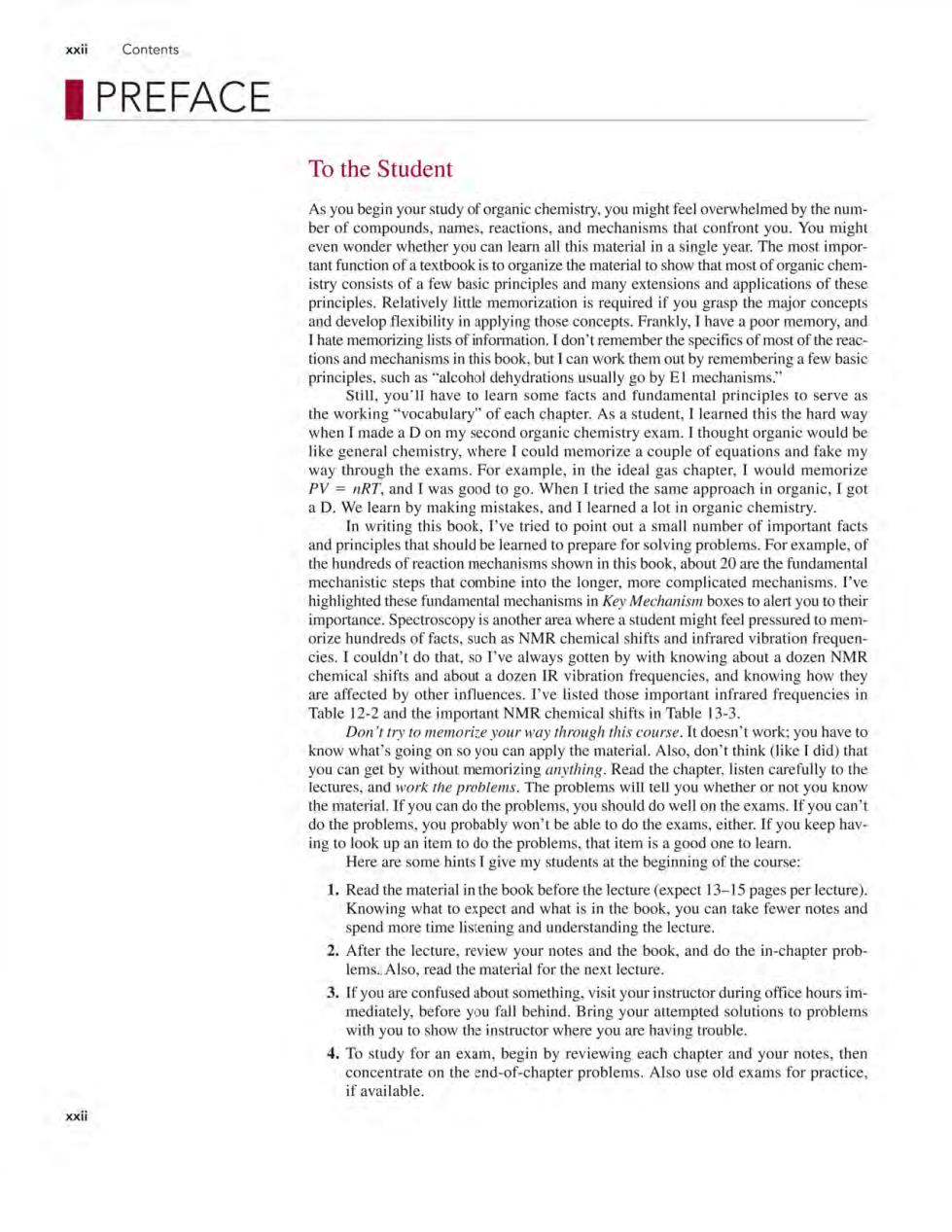正在加载图片...

Contents PREFACE To the Student As you begin your study of organic chemistry.you might feel overwhelmed by the num ber of compounds names. n you.You migh istry consists of a few basic principles and many extensions and applications of these develop fle tions and mechanisms in this book.but I can work them out by rememberinga few basic principlessuchdehydrations ygo by EI mechanism you n the workin have to when I made a D on my se like general chemistry,where I could memorize a couple of equations and fake my the exams.For example,in the ideal gas chapter,I 7.an aD.We s good to In writing this book.I've tried to point out a small number of impo tant facts and principles that should be learned to prepare for solving problems.For example,of the hundreds of reaction me shown in this book. ut 20 are the fundamenta importance.Spectroscopy is another area where a student might feel pressured to mem. orize hundreds of facts.such as NMR chemical shifts and infrared vibration frequer t do out a dozen r Tahea e mpo NMR chemic T1 I've listed thos frequencies ave to youway don'think (like know what nyou can apply th ccures.and.The tel you whether or not you know you can do the problems,you should do well on the exams.If you can't o the problems. you pro oly won f you keep hav ng t 1.Read the material in the book before the lecture (expect 13-15 pages per lecture) ing the lecture t lecture you al od you notes,then if available. xxii Contents PREFACE xxii To the Student As you begin your study of organic chemistry, you might feel overwhelmed by the number of compounds, names, reactions, and mechanisms that confront you. You might even wonder whether you can learn all this material in a single year. The most important function of a textbook is to organize the material to show that most of organic chemistry consists of a few basic principles and many extensions and applications of these principles. Relatively little memorization is required if you grasp the major concepts and develop flexibility in applying those concepts. Frankly, I have a poor memory, and I hate memorizing lists of information. I don't remember the specifics of most of the reactions and mechanisms in this book, but I can work them out by remembering a few basic principles, such as "alcohol dehydrations usually go by El mechanisms." Still, you'll have to learn some facts and fundamental principles to serve as the working "vocabulary" of each chapter. As a student, I learned this the hard way when I made a D on my second organic chemistry exam. I thought organic would be like general chemistry, where I could memorize a couple of equations and fake my way through the exams. For example, in the ideal gas chapter, I would memorize PV = nRT, and I was good to go. When I tried the same approach in organic, I got a D. We learn by making mistakes, and I learned a lot in organic chemistry. In writing this book, I've tried to point out a small number of important facts and principles that should be learned to prepare for solving problems. For example, of the hundreds of reaction mechanisms shown in this book, about 20 are the fundamental mechanistic steps that combine into the longer, more complicated mechanisms. I've highlighted these fundamental mechanisms in Key Mechanism boxes to alert you to their importance. Spectroscopy is another area where a student might feel pressured to memorize hundreds of facts, such as NMR chemical shifts and infrared vibration frequencies. I couldn't do that, so I've always gotten by with knowing about a dozen NMR chemical shifts and about a dozen IR vibration frequencies, and knowing how they are affected by other influences. I've listed those important infrared frequencies in Table 12-2 and the important NMR chemical shifts in Table 13-3. Don't try to memorize your way through this course. It doesn't work; you have to know what's going on so you can apply the material. Also, don't think (like I did) that you can get by without memorizing anything. Read the chapter, listen carefully to the lectures, and work the problems. The problems will tell you whether or not you know the material. If you can do the problems, you should do well on the exams. If you can't do the problems, you probably won't be able to do the exams, either. If you keep having to look up an item to do the problems, that item is a good one to learn. Here are some hints I give my students at the beginning of the course: 1. Read the material in the book before the lecture (expect 13-15 pages per lecture). Knowing what to expect and what is in the book, you can take fewer notes and spend more time listening and understanding the lecture. 2. After the lecture, review your notes and the book, and do the in-chapter problems. Also, read the material for the next lecture. 3. If you are confused about something, visit your instructor during office hours immediately, before you fall behind. Bring your attempted solutions to problems with you to show the instructor where you are having trouble. 4. To study for an exam, begin by reviewing each chapter and your notes, then concentrate on the end-of-chapter problems. Also use old exams for practice, if available